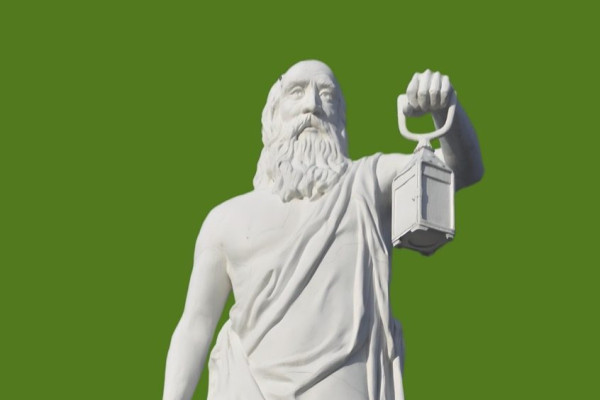Philosophers are more likely to be poor than rich. Some have made a virtue out of that.
Diogenes of Sinope, the original Cynic, watched a mouse that seemed to be content with very little, just a scrap of grain, and modelled his own abstemious behaviour accordingly. If the mouse could get by with so little, why couldn’t he? He lived with just one cloak and no other clothes and used a large empty storage jar for shelter. He did have a cup, but when he saw a boy drinking using his hands, he got rid of that. His was a minimalist life, and he claimed to be very content with it. He managed to get some laughs at the expense of the rich too. When he was asked what kind of wine he liked to drink, he replied “other people’s”. And when a rich man asked Diogenes not to spit on his exquisite marble floor or on his fine furniture, the philosopher spat in the man’s face, saying that was the only dirty place left to spit. When Alexander the Great, the most powerful man in the world at that time, visited him and offered him whatever he wanted, Diogenes asked him to move his shadow as he was blocking the sun.
This indifference and even antagonism to wealth was mirrored later when the devil tempted another famous moral philosopher, Jesus Christ. The devil offered Christ all the kingdoms of the world if he would worship him. But Christ wasn’t interested. He told the devil that he should worship God and serve only him. In Luke’s gospel, Christ says that “it is easier for a camel to go through the eye of a needle than for a rich man to enter the kingdom of God”. He tells the rich to sell all they have and give it to the poor. Rich Christians like to think of this as a metaphor, or an exaggeration, or to explain how much they are giving away, even though they still retain quite a lot for themselves. They don’t tend to read Luke’s gospel too closely, because there he tells them that the poor are “blessed”; and he heaps woe on the rich. Nevertheless, some rich Christians have taken the aphorism of the eye of the needle seriously. Francis of Assisi stands out for this. He was very wealthy as a young man, gave away everything, lived as a beggar and preached the virtues of poverty, engaging in acts of radical generosity, giving his own clothes to the destitute. Francis called money “dung” and preached that it was a source of evil.
Lucius Annaeus Seneca, who was born four years before Christ, in contrast, was famously rich. That makes him unusual amongst philosophers, though not unique. He was from a reasonably affluent family to start with but then made huge amounts of money because of his connections with the emperor Nero. He’d taught him, and later acted as his speech writer and adviser. Seneca also increased his wealth by lending and charging high rates of interest. He owned villas and vineyards and threw lavish parties. And yet at the same time he preached the kind of Stoicism that declares that wealth, though not something to despise, doesn’t itself bring happiness, or at least not once your basic needs have been met. It is an ‘indifferent’. Some of his contemporaries thought him a hypocrite for this, preaching one approach to life, but living another. He probably was. His great wealth didn’t prevent him being sent into exile because of his alleged involvement in a sex scandal, or later, after his return to Rome, being ordered to kill himself because of his supposed part in a conspiracy, an order that he followed.
Generally, though, throughout history, philosophers have gone cap in hand to patrons without whose support they wouldn’t be able to find time to get on with their thinking and writing. Thomas Hobbes and John Locke both acted as tutors to the wealthy. Jean-Jacques Rousseau, before his books brought him income, relied on the generosity of rich benefactors and subsidised that by teaching music. Voltaire (François-Marie Arouet), though, came up with a different solution to the problem of how to have enough money to survive and get on with your philosophical writing. Together with the mathematician Charles Marie de la Condamine, he found a way of gaming the national lottery that was run by the French government. They set up a syndicate and made the equivalent of millions of dollars by using a system that allowed them to win much of the time. Voltaire invested his winnings wisely and then became super rich. He didn’t have to worry about money again. He could just get on with writing his philosophy, plays, and satire.
Ludwig Wittgenstein, the great 20th century Viennese thinker, was one of the richest philosophers of all. He was incredibly rich by any standards. Yet, unlike Seneca and Voltaire, he didn’t stay that way. He chose to give it all away. When his father Karl, one of the wealthiest industrialists in Europe, died in 1913, Wittgenstein received a huge inheritance. However the philosopher was an ascetic by temperament, and deeply uncomfortable about money and possessions. When he was a professor in Trinity College, Cambridge, his room was notoriously spartan – just a table and some deck chairs and a small wardrobe. He was not someone to spend lavishly on himself. Far from it. He almost immediately set about passing on a large part of his inheritance to needy writers and artists, among them the poet Rainer Maria Rilke and the modernist architect Adolf Loos. Then, after the First World War, in which he served on the front line and was captured and held as a prisoner of war, he gave away the rest of the money to his brothers and sisters. He really didn’t want it and thought others would make better use of it.
More recently, the Australian moral philosopher Peter Singer won the 2021 Berggruen Prize, a prize that was set up in part because there is no Nobel Prize specifically for philosophy. The prize money for the winner is $1 million US dollars. But Singer did not stay wealthy for long. Like Wittgenstein, he gave it all away to people who needed it more than him. He immediately pledged $600,000 to The Life You Can Save, an organisation inspired by his ideas about how money can be used most effectively to preserve lives threatened by poverty and disease. He pledged the remainder to a portfolio of charities which work to oppose factory farming and to others that promote a plant-based diet. This generosity is completely consistent with his views about how we should live, and how much weight we should give to other people’s wishes when deciding how to act. But it’s admirable nevertheless.
From the Wealth edition, which can be purchased from our online store







